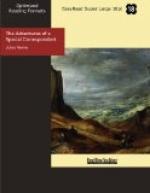The gong was struck for the last time; we hasten into our cars.
And the baron, what has become of him?
Here he comes out on to the platform like a whirlwind. He has found his papers at the bottom of his nineteenth pocket. He has obtained the necessary visa—and it was time.
“Passengers for Pekin, take your seats!” shouts Popof in a sonorous voice.
The train trembles, it starts, it has gone.
CHAPTER XVII.
We are off on a Chinese railway, single line, the train drawn by a Chinese engine, driven by a Chinese driver. Let us hope we shall not be telescoped on the road, for among the passengers is one of the chief functionaries of the company in the person of Faruskiar.
After all, if an accident should happen it will break the monotony of the journey, and furnish me with an episode. I am forced to admit that up to the present my personages have not behaved as I expected. The drama does not run well, the action languishes. We want something startling to bring all the actors on—what Caterna would call “a good fourth act.”
But then Ephrinell and Miss Bluett are all the time absorbed in their commercial tete-a-tete. Pan Chao and the doctor amused me for a time, but they are not equal to it now. The actor and the actress are of no use without opportunity. Kinko, Kinko himself, on whom I had built such hopes, has passed the frontier without difficulty, he will reach Pekin, he will marry Zinca Klork. Decidedly there is a want of excitement. I cannot get anything out of the corpse of Yen Lou! and the readers of the Twentieth Century who looked to me for something sensational and thrilling.
Must I have recourse to the German baron? No! he is merely ridiculous, stupidly ridiculous, and he has no interest for me.
I return to my idea: I want a hero, and up to the present no hero has appeared on the scene.
Evidently the moment has come to enter into more intimate relations with Faruskiar. Perhaps he will not now be so close in his incognito. We are under his orders, so to say. He is the mayor of our rolling town, and a mayor owes something to those he governs. Besides, in the event of Kinko’s fraud being discovered I may as well secure the protection of this high functionary.
Our train runs at only moderate speed since we left Kachgar. On the opposite horizon we can see the high lands of the Pamir; to the southwest rises the Bolor, the Kachgarian belt from which towers the summit of Tagharma lost among the clouds.
I do not know how to spend my time. Major Noltitz has never visited the territories crossed by the Grand Transasiatic, and I am deprived of the pleasure of taking notes from his dictation. Dr. Tio-King does not lift his nose from his Cornaro, and Pan Chao reminds me more of Paris and France than of Pekin and China; besides, when he came to Europe he came by Suez, and he knows no more of Oriental Turkestan than he does of Kamtschatka. All the same, we talk. He is a pleasant companion, but a little less amiability and a little more originality would suit me better.




